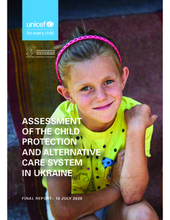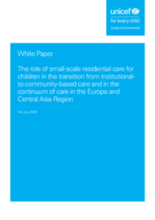Displaying 241 - 250 of 956
This ISS study of the child protection system as it particularly relates to alternative care was commissioned by UNICEF Ukraine. This report contains an overview of the child protection and alternative care system in Ukraine based on the process of a desk review and a 10 day fact finding mission in Ukraine in February 2020 undertaken by a team of experts from International Social Service (ISS).
The current study employed Interpretative Phenomenological Analysis (IPA) to guide the analysis of semi-structured interviews with eight young people with a range of care experiences, looking at the topic of confiding in others.
The current study employed Interpretative Phenomenological Analysis (IPA) to guide the analysis of semi-structured interviews with eight young people with a range of care experiences, looking at the topic of confiding in others.
This article describes the psychosocial resilience processes that facilitate successful transitioning of young women as they journey out of residential care towards young adulthood.
This White Paper summarizes evidence on the current use and impact of small-scale residential care (also: ‘SSRC’) and offers guidance on how to enable all children to grow up in a loving and stable family environment. It aims to promote better decisionmaking among policy-makers, local governments, non-governmental organizations (NGOs), as well as child welfare and other, allied practitioners of the establishment.
This article reports the findings of MIRRA, a participatory research project on the memory and identity dimensions of social care recordkeeping.
This study presents findings from a systematic review of interventions that target successful reunification.
In this commentary piece, Aisha K Yousafzai - of the Department of Global Health and Population at the Harvard TH Chan School of Public Health and the and Department of Paediatrics and Child Health at Aga Khan University - notes that "the evidence presented [in the Lancet Group Commission on the institutionalisation and deinstitutionalisation of children] and their call to action to ensure abandoned children can thrive in family-based care environments rather than in institutions matters now more than ever as the global community addresses unprecedented challenges to ensure a generation of children are not left behind with respect to their survival, health, development, learning, and safety."
This document is a summary of three papers on how to effectively support children who have exited armed forces and armed groups and contains actionable recommendations at the end to stimulate thinking and action to assist these most vulnerable children and their communities.
This paper explores how college graduates with foster care histories fare after graduating from a 4-year college that offered a campus-based program.



